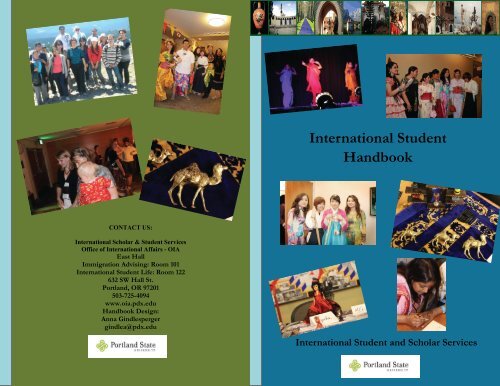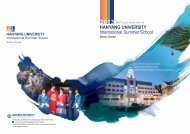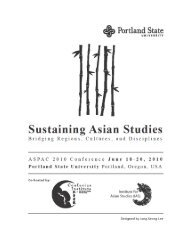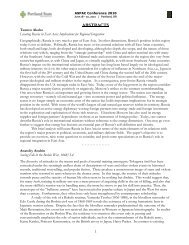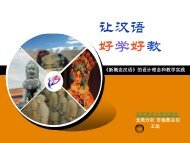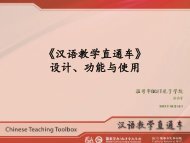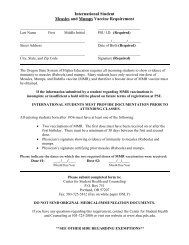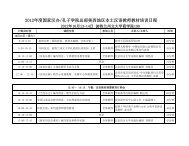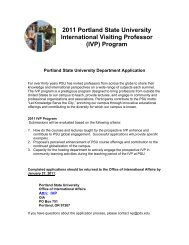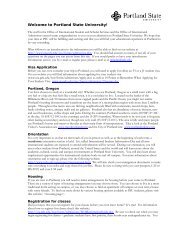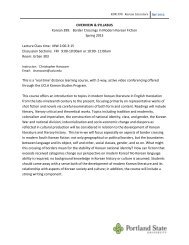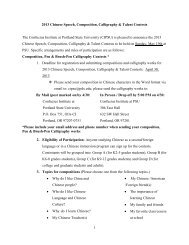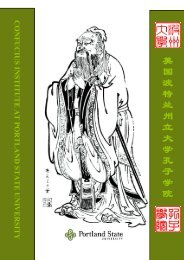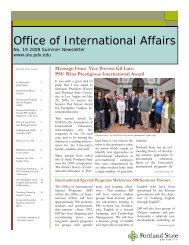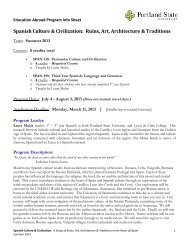International Student Handbook - Office of International Affairs ...
International Student Handbook - Office of International Affairs ...
International Student Handbook - Office of International Affairs ...
You also want an ePaper? Increase the reach of your titles
YUMPU automatically turns print PDFs into web optimized ePapers that Google loves.
CONTACT US:<br />
<strong>International</strong> Scholar & <strong>Student</strong> Services<br />
<strong>Office</strong> <strong>of</strong> <strong>International</strong> <strong>Affairs</strong> - OIA<br />
East Hall<br />
Immigration Advising: Room 101<br />
<strong>International</strong> <strong>Student</strong> Life: Room 122<br />
632 SW Hall St.<br />
Portland, OR 97201<br />
503-725-4094<br />
www.oia.pdx.edu<br />
<strong>Handbook</strong> Design:<br />
Anna Gindlesperger<br />
gindlea@pdx.edu<br />
<strong>International</strong> <strong>Student</strong><br />
<strong>Handbook</strong><br />
<strong>International</strong> <strong>Student</strong> and Scholar Services
WELCOME!<br />
We extend a special welcome to all new international students at<br />
Portland State University. As an international student, you have a<br />
unique opportunity to expand and share your cultural, social, and<br />
academic experiences.<br />
We encourage you to come in to the <strong>Office</strong> <strong>of</strong> <strong>International</strong><br />
<strong>Student</strong> and Scholar Services (ISSS) with any questions you might<br />
have. Not only can we help you with immigration questions, but we<br />
can answer questions about Portland State University, the city <strong>of</strong><br />
Portland, and the surrounding area.<br />
Our <strong>of</strong>fice is located in:<br />
East Hall<br />
632 SW Hall St. on the corner <strong>of</strong> Broadway Ave. and Hall St.<br />
Phone: 503-725-4094<br />
Website: http://www.oia.pdx.edu<br />
If you would like to see an Immigration Advisor go to: Room 101<br />
If you would like to see the <strong>International</strong> <strong>Student</strong> Life Team go to:<br />
Room 122<br />
<strong>International</strong> <strong>Student</strong> & Scholar Services wishes you a successful and<br />
memorable time at Portland State University.<br />
Call 503-725 + extension:<br />
Davis, Joshua - F1 INTL <strong>Student</strong> & SEVIS Advisor x4050<br />
Gindlesperger, Anna - INTL <strong>Student</strong> Life Advisor x9766<br />
Harris, Paula - INTL <strong>Student</strong> Advisor x5503<br />
Kenney, Sarah - INTL <strong>Student</strong> Life Advisor x5943<br />
Jasperson, DJ - Insurance Specialist x4095<br />
Luther, Christina - Associate Director, ISSS x5468<br />
McLaughlin, Megan F1 INTL <strong>Student</strong> Advisor x4197<br />
Miller, Michele - IELP & ESL <strong>Student</strong> Advisor x8126<br />
Nilenders, Eve - J1 & INTL Faculty Advisor x5075<br />
Townley, Jill - Associate Director, INTL <strong>Student</strong> Life x8563<br />
Turay, Mike - Program Assistant x4094<br />
VanDyck, Judy - Director x4878<br />
VII. Dictionary/Glossary <strong>of</strong> Academic Terms and<br />
Abbreviations<br />
DICTIONARY<br />
Academic Advisor An advisor, either in UASC or in your major<br />
department, who helps you choose your courses and understand your<br />
graduation requirements.<br />
ASPSU (Associated <strong>Student</strong>s <strong>of</strong> PSU) Portland State’s student government:<br />
http://www.aspsu.pdx.edu/<br />
CAS The Course Applicability System (CAS) provides transfer course<br />
equivalency information and degree progress reports: http://www.pdx.edu/<br />
admissions/transfer_courses.html<br />
Core curriculum The courses that all students are required to complete<br />
prior to graduation, regardless <strong>of</strong> their academic major.<br />
Course load The number <strong>of</strong> courses taken per term.<br />
Credit hour Credit awarded for participation and completion <strong>of</strong> a course.<br />
Credit load Total number <strong>of</strong> credits for which a student is enrolled. A<br />
full-time credit load per term for undergraduates is 12 credit hours and a<br />
full-time load for graduates is 9 credit hours.<br />
DARS The Degree Audit Report System (DARS) is a tool to assist in the<br />
academic advising process. It is meant to help advisors and students in the<br />
process <strong>of</strong> course selection and academic program planning. <strong>Student</strong>s<br />
should review their DARS report prior to meeting with an Academic<br />
Adviser.<br />
Distance learning Providing learning through media (e.g. computer) where<br />
the teacher and student are physically separated.<br />
Elective A course selected by the student, which is not a requirement for a<br />
program but still fulfills graduation requirements.<br />
FERPA Refers to a student’s right <strong>of</strong> privacy concerning release <strong>of</strong> information<br />
without authorized consent. (FERPA stands for Family Educational<br />
Rights and Privacy Act <strong>of</strong> 1974).<br />
Click here for a link to a variety <strong>of</strong> PSU Campus Maps and Directions<br />
which will help you as you learn to find your way around campus:<br />
http://www.fap.pdx.edu/floorplans/
Clothing<br />
SHOPPING<br />
The city <strong>of</strong> Portland will not disappoint those who are looking for the<br />
typical American experience <strong>of</strong> shopping in a mall. The closest mall, Pioneer<br />
Place, is located downtown, just a 5-10 minute walk from campus.<br />
Lloyd Center is another mall just across the Willamette River. You can get<br />
there by taking the Max (Portland’s rail line) from downtown. Lloyd Center<br />
also has a two movie theaters.<br />
You may choose to buy second-hand clothes at one <strong>of</strong> Portland’s many<br />
thrift shops. These stores sell things that are used. In the last few years,<br />
there has been a growing trend for college students to buy clothes in<br />
second-hand stores. Sometimes the items they sell are very good, and you<br />
can buy them for much less than if they were new. Look in the Yellow<br />
Pages under the heading Second Hand Stores and Thrift Shops to find one near<br />
you. Some <strong>of</strong> these stores sell items that were donated. When these items<br />
are sold, the money is used to help people who are hungry or homeless.<br />
Furniture<br />
Furniture can be purchased or rented. A number <strong>of</strong> companies rent<br />
furniture in the Portland area. Look in the Yellow Pages under Furniture<br />
Renting & Leasing. Call around to compare prices. You may also contact<br />
FOCUS (tel: 503-725-4196), a community group which helps new<br />
international students. FOCUS is located in East Hall, Room 312.
VISA ISSUES<br />
I. VISA ISSUES<br />
1. YOUR LEGAL STATUS IN THE USA<br />
Credit Requirements<br />
<strong>International</strong> students must be enrolled full-time at Portland State<br />
University. Full-time status is defined below:<br />
Undergraduate <strong>Student</strong>s:<br />
A minimum <strong>of</strong> 12 credit hours successfully completed per term.<br />
Graduate <strong>Student</strong>s:<br />
A minimum <strong>of</strong> 9 credit hours successfully completed per term. At least one,<br />
but usually all <strong>of</strong> these classes will be taken at the graduate level.<br />
One class must be at the graduate level in order for you to fulfill your<br />
obligation to be full-time enrolled.<br />
Post-baccalaureate <strong>Student</strong>s:<br />
A minimum <strong>of</strong> 12 credit hours if pursuing a second undergraduate degree.<br />
A minimum <strong>of</strong> 9 credits hours if pursuing a graduate degree. At least one<br />
class must be at the graduate level in order for you to fulfill your obligation<br />
to be full-time enrolled.<br />
Full-time enrollment is a serious immigration matter and should not be<br />
taken lightly. If you have any questions regarding your class credit hours<br />
and your immigration status, contact an ISSS international student advisor.<br />
6. SHOPPING<br />
Below are two large grocery stores near PSU:<br />
Safeway: 1030 SW Jefferson St., Portland, 97201<br />
Fred Meyer: 100 NW 20th Ave., Portland, 97209<br />
If you are looking for items that you can use to prepare foods from your<br />
home country, you might look in the phone book under “grocers-retail” for<br />
small specialty stores. Some <strong>of</strong> these stores are:<br />
African <strong>International</strong> Food Market:<br />
922 N Killingsworth St., Portland, 97217<br />
An Dong (Chinese): 5441 SE Powell Blvd., Portland, 97206<br />
Bazaar Pakistani/Indian/Middle Eastern Market Place:<br />
10255 SW Canyon Rd, Beaverton, 97005<br />
Dashen <strong>International</strong> Groceries: 3022 NE Glisan St., Portland, 97232<br />
Paldo World (Korean): 3975 SW 114th Ave., Beaverton, 97005<br />
Roman Russian Food Store: 6911 SE Foster Road, Portland, 97206<br />
Uwajimaya (Japanese):<br />
10500 SW Beaverton-Hillsdale Hwy, Beaverton 97005<br />
Natural and organic foods can be found at:<br />
New Seasons: 1954 SE Division St., Portland, 97202<br />
Food Front Cooperative Grocery<br />
2375 NW Thurman, Portland, 97210<br />
Whole Foods Market: 2825 E Burnside, Portland, 97214<br />
SHOPPING
TRANSPORTATION<br />
5. TRANSPORTATION<br />
Public Transportation<br />
Tri-Met is the Portland public transportation<br />
system and the least expensive way to travel<br />
around the city. In fact, PSU is located in<br />
Fareless Square, the downtown area where<br />
you may ride the Streetcar and Max trains<br />
for free. Note: buses are not free in Fareless<br />
Square.<br />
If you live where you will be taking the bus<br />
regularly, it is less expensive to buy a quarterly<br />
bus pass at the discounted student rate.<br />
Bus passes can be purchased at the Information<br />
Center, located at 506 SW Mill in the Urban Center. This <strong>of</strong>fice also<br />
has bus route information, or you can go to the Tri-Met <strong>of</strong>fice in Pioneer<br />
Courthouse Square. To get a discounted pass, you need to show your PSU<br />
<strong>Student</strong> ID card. One-way tickets can be purchased on the bus starting<br />
from $2.05, and you must have exact change.<br />
Cars<br />
If you are going to buy a car, you must have the following:<br />
An Oregon driver’s license: If you intend to stay in Oregon for more than<br />
six months (e.g., students enrolled as undergraduate or graduate students),<br />
you may apply for an Oregon Driver’s License (ODL). Pro<strong>of</strong> <strong>of</strong> residence<br />
and two forms <strong>of</strong> identification are required. More information is available<br />
at http://www.oregon.gov/ODOT/DMV/index.shtml<br />
Liability insurance: The law requires that you have liability insurance on<br />
your vehicle. This insurance covers physical or property damage you or your<br />
car may do to another car and/or person in the event <strong>of</strong> an accident. Your<br />
license will be suspended if you do not have liability insurance.<br />
A parking permit: If you will be parking your car on campus, you will want<br />
to purchase a parking permit from Portland State University.<br />
Bicycles<br />
Portland is a very bicycle-friendly city and bikes are another inexpensive<br />
way to travel around Portland. Bike lanes and bike paths are marked<br />
throughout the city. Bike theft can be problematic; therefore, it is important<br />
to keep your bike well-secured. We also recommend that you pay a visit to<br />
the Campus Public Safety <strong>of</strong>fice where you can use an engraver to engrave<br />
an identification number on your bicycle. This helps identify it if it is stolen.<br />
A good website to check out if you are interested in using your bicycle to<br />
get around Portland is http://www.portlandonline.com/transportation/<br />
Grades<br />
The following marks are acceptable as grades for course completion:<br />
A, B, C, D, and P (Pass)<br />
The following marks are not acceptable:<br />
X No basis for grade<br />
W Withdraw<br />
AU Audit<br />
The following grades may jeopardize your immigration status.<br />
We recommend that you speak with an international student advisor as<br />
soon as you know you may receive one so that your options can be explained<br />
to you:<br />
F Fail<br />
I Incomplete<br />
NP No pass<br />
Co-Enrollment<br />
YOUR LEGAL STATUS<br />
<strong>International</strong> students may enroll simultaneously at 2 USCIS approved<br />
institutions. This is called being co-enrolled. Portland State University’s<br />
policy requires those students wishing to co-enroll to carry at least half <strong>of</strong><br />
their required credits at PSU (for undergraduate students, this means at least<br />
6 credits, for graduate students, as least 5 credits). Your remaining credits<br />
may be taken at another institution.<br />
If you wish to co-enroll, you must do the following:<br />
-You must bring pro<strong>of</strong> <strong>of</strong> your enrollment at the other institution to East<br />
Hall 101 (ISSS) before the beginning <strong>of</strong> the term in which you wish to co<br />
-enroll<br />
-You must bring an un<strong>of</strong>ficial grade report to ISSS at the end <strong>of</strong> each term<br />
you co-enroll. Please note: your co-enrollment at another institution may<br />
not hinder your progress towards completing your degree in a timely<br />
manner, in other words, the classes you are taking at other institutions<br />
should count towards your graduation from PSU.<br />
If you are interested in co-enrolling, you should speak to an advisor at<br />
<strong>International</strong> <strong>Student</strong> and Scholar Services before doing so to ensure that<br />
you understand clearly what is allowed and what is not.
VISA ISSUES<br />
Responsibilities <strong>of</strong> <strong>International</strong> <strong>Student</strong>s<br />
As an international student at Portland State University, you must always<br />
remember that your immigration status is your responsibility and that you<br />
are ultimately in charge <strong>of</strong> maintaining it. Some things for you to be aware<br />
<strong>of</strong> include:<br />
1) You must be enrolled as a full-time student for nine consecutive<br />
months (three consecutive terms) each year for the duration <strong>of</strong> your studies.<br />
For undergraduate students, this means that you must complete a<br />
minimum <strong>of</strong> 12 credits each term. For graduate students it means that you<br />
must complete a minimum <strong>of</strong> 9 credits (at least 3 <strong>of</strong> which must be at the<br />
graduate level) each term or you must be working full-time on a thesis or<br />
dissertation.<br />
NOTE: In order to complete a credit hour, you must receive either a<br />
passing grade (A-D) or a P (pass). Withdrawal from a course or a grade<br />
option change to audit will not count as credit toward your full-time status.<br />
If for any reason you feel you are unable to complete the required number<br />
<strong>of</strong> credit hours, come to ISSS so we can discuss your situation.<br />
2) You must understand your immigration status and maintain it. This<br />
includes obtaining extensions <strong>of</strong> your I-20 (F-1 students) or DS-2019<br />
(J-1 students). If you will not complete your program by the date indicated<br />
on those forms, you must notify us <strong>of</strong> major or level changes.<br />
3) You must receive permission from ISSS before working on or <strong>of</strong>f<br />
campus.<br />
4) You are required by the Federal Government to keep the university<br />
informed <strong>of</strong> any address changes. Addresses can be updated online in the<br />
PSU Information System (Banweb) or reported directly to ISSS or the<br />
Registrar’s <strong>of</strong>fice in Neuberger Hall. Changes must be reported within 10<br />
days <strong>of</strong> your moving to a new address. Addresses are not considered to be<br />
confidential and will be published in the student directory and released if<br />
requested by a third party. <strong>Student</strong>s who do not want their addresses<br />
released must complete a confidentiality request in Neuberger Hall. The<br />
ISSS <strong>Office</strong> will notify the USCIS <strong>of</strong> your new address. Please note that if<br />
you are expecting mail from USCIS you must also notify them that you<br />
have moved. Mail from the USCIS is federal mail and it will not be<br />
forwarded by the US Postal Service.<br />
Cell Phones<br />
PHONES<br />
Just as there are many land line service providers, the number <strong>of</strong> cell phone<br />
companies is overwhelming. We recommend that you talk to other students<br />
about what plans they have found which best suit their needs. Again, please<br />
exercise caution when signing up for service with a cell phone company. A<br />
deal that appears to be too good to be true probably is! Make sure you understand<br />
the contract very well before you agree to it. Cell phone companies<br />
<strong>of</strong>ten require year-long commitments and if you try to break those<br />
commitments early the penalties can be very costly.<br />
Phone Services<br />
Long distance and overseas services vary according to the choice <strong>of</strong> your<br />
carrier. Calling long distance can be expensive. Be aware that there are<br />
certain times <strong>of</strong> day when it is more expensive to call than others. Check the<br />
Yellow Pages for long-distance carriers. You may want to ask other PSU<br />
students who have been here for some time what company they would<br />
recommend and why. Make sure you find the best service for your needs.
4. TELECOMMUNICATIONS<br />
In this day and age, telecommunications have become complex at best! We<br />
know that the different types <strong>of</strong> telecommunications options available to you<br />
are very important for you to stay in touch with your friends and families at<br />
home.<br />
Telephones<br />
TELECOMMUNICATIONS<br />
There are many different phone companies which provide land line service<br />
inside your home or apartment. You’ll have to do some research to find out<br />
which plan has the best options for you. Often phone companies <strong>of</strong>fer what<br />
are called packages (bundles <strong>of</strong> phone service, wireless service, cable TV<br />
service, etc.) for lower prices than you’d pay if you signed up for each<br />
service separately. Be very careful, though, when entering into such<br />
agreements, as most “good deals” require a year or longer commitment. A<br />
phone company will charge an initial installation fee (about $60.00), and<br />
there will also be monthly fees (depending upon services, they can be $18<br />
-$35). For general plans, you will not be charged for local calls you make<br />
from your home, but you will usually be charged for long distance service.<br />
Note, long distance <strong>of</strong>ten means outside the greater Portland area!<br />
As cell phones become more popular, there are fewer and fewer public<br />
phones, but most <strong>of</strong> these phones are still coin-operated phones rather<br />
than card phones. Phones can be found in public places and a local call is<br />
usually 50 cents and you can talk for an unlimited period <strong>of</strong> time.<br />
The phone company publishes telephone books for every town. Most<br />
people who receive telephone services are listed alphabetically in the<br />
telephone books. If you would prefer to not be listed, you need to tell the<br />
phone company this when you sign up for service.<br />
Local information or directory assistance can be obtained by dialing 411.<br />
Check the front <strong>of</strong> the phone book for area codes and tips on how to find<br />
long-distance numbers. There is a charge for 411 calls.<br />
Please note: Oregon uses a system <strong>of</strong> 10-digits. In the Portland area, you<br />
must dial the area code (503) before dialing the phone number. All calls<br />
with the area code 541 are considered to be long distance.<br />
Immigration Documents<br />
YOUR LEGAL STATUS<br />
Passport<br />
You passport must be valid at all times. Your F-1 or J-1 status requires that<br />
your passport be valid at least 6 months into the future. Be sure to allow<br />
yourself plenty <strong>of</strong> time to renew your passport. To do so, contact the Embassy<br />
or Consulate <strong>of</strong> your country.<br />
I-94 Card<br />
At your port <strong>of</strong> entry into the United States, a small white card was stapled<br />
to your passport by an immigration <strong>of</strong>ficial. This form is very important and<br />
should be kept in a safe place. On that card is written your port <strong>of</strong> entry,<br />
your arrival date, your visa status, and how long you have been given<br />
permission to stay in the U.S. (for F-1 students this should read D/S).<br />
Also located on your I-94 Card is your Admission Number. This number<br />
was given to you before you went through U.S. Customs on your first entry<br />
to the United States. The number looks something like this: 995-000935<br />
60. Be certain to include this information when you complete your Fact<br />
Sheet when checking in at ISSS. If your I-94 Card has been lost or stolen,<br />
contact ISSS immediately.<br />
NOTE: J-1 students will either have D/S or a date on the I-94 card. If<br />
your I-94 card is date specific, the date on it should match the completion<br />
date on your form DS-2019.
VISA ISSUES<br />
I-20 Document (F-1 <strong>Student</strong>s Only)<br />
The I-20 is the document Portland State University prepared to show the<br />
US Consulate abroad that you had been admitted to PSU and had shown<br />
sufficient finances for one year <strong>of</strong> study. You should keep all <strong>of</strong> the I-20s<br />
you are given while studying in the United States. This form contains<br />
important information and becomes a record <strong>of</strong> your immigration history.<br />
You need to obtain a new I-20 if the information on your I-20 changes in<br />
any way. If your I-20 form is ever lost or stolen, please notify ISSS<br />
immediately.<br />
DS-2019 (J1 visa holders only)<br />
The DS-2019 is the form you received from Portland State University or<br />
your sponsoring agency and is to be retained by you during your entire<br />
length <strong>of</strong> study. This form has important information and is a record <strong>of</strong><br />
your immigration history. You need to obtain a new DS-2019 if the<br />
information on your DS-2019 changes in any way. If your DS-2019 form is<br />
ever lost or stolen, please notify ISSS immediately.<br />
Duration <strong>of</strong> status (D/S)<br />
The D/S notation on your I-94 card stands for Duration <strong>of</strong> Status. As long<br />
as you are maintaining full-time status (a minimum <strong>of</strong> 12 credits for<br />
undergraduate students and a minimum <strong>of</strong> 9 graduate level credits for<br />
graduate students) at the school you are authorized to attend, you are<br />
maintaining your immigration status. Maintaining full-time status means not<br />
only registering for the required number <strong>of</strong> credits, but also successfully<br />
completing them. Acceptable grades are explained on pg. 5 <strong>of</strong> this<br />
handbook.<br />
Extensions <strong>of</strong> Stay<br />
F-1 and J-1 students are admitted to the U.S. for a period <strong>of</strong> stay noted as<br />
duration <strong>of</strong> status or D/S on the I-94 card. Duration <strong>of</strong> status is defined as<br />
the period during which you, as a student, are pursuing a full course <strong>of</strong><br />
study in any educational program and any periods <strong>of</strong> authorized practical<br />
training. F-1 students are allowed a 60-day grace period within which to<br />
depart from the U.S. following completion <strong>of</strong> the degree program or<br />
Optional Practical Training and a 15-day grace period if the student breaks<br />
<strong>of</strong>f his or her course <strong>of</strong> study prior to completion (with ISSS approval).<br />
J-1 students are allowed a 30-day grace period following completion period<br />
<strong>of</strong> study or academic training.<br />
SAFETY<br />
Safety <strong>of</strong> Personal Possessions<br />
In order to ensure that nothing is stolen from you, you should follow a few<br />
safety tips:<br />
Always keep your apartment, dorm room, or house door locked at all times.<br />
Also be sure you know who is at the door before you open it up.<br />
If you live on the ground floor, it is not advisable to leave your<br />
windows open at night or when you are gone. It is a good idea to open your<br />
windows only a few inches and block them with a board so no one can<br />
open them further and crawl in.<br />
If you keep valuables such as jewelry and cash in your home,<br />
Make sure they are well hidden. Do not carry large amounts <strong>of</strong> cash.<br />
Keep your passport in a safe place. Carry it with you only when<br />
necessary. If your passport is stolen, report the theft to your Embassy in the<br />
U.S. and to ISSS. If it is stolen on campus, you should also report the theft<br />
to the Campus Public Safety <strong>of</strong>fice, 503-725-4404. The Campus Public<br />
Safety <strong>of</strong>fice also has an engraving machine you can use to engrave your<br />
laptop, bicycle or other personal items with an identifying mark. It has been<br />
recommended that you use your Passport Number as an identifier.<br />
If you own or use a car, never leave anything valuable in it. If you must,<br />
put valuables in the trunk, hide them under a seat, or cover them before you<br />
leave your car.<br />
Avoid parking on dark streets. The best place to park is under a<br />
street light or in a staffed parking structure. Make sure the car you are driving<br />
is insured!<br />
Textbook theft is something that is peculiar to a university campus.<br />
At Portland State, there is a period <strong>of</strong> time during the start <strong>of</strong> each term,<br />
when students can return their textbooks to the bookstore for a full refund<br />
provided you have your receipt with you. If your textbooks are stolen and<br />
the receipt is with them, the thief can return your textbooks to the<br />
bookstore for a full refund. We advise you to keep your textbook receipt in<br />
your wallet and NOT with your textbooks to prevent a thief from being<br />
able to return your books. They are expensive and YOU need them!
SAFETY<br />
3. SAFETY ISSUES<br />
While Portland is considered to be a very safe city, it is still a good idea to<br />
take the same precautions with respect to your personal safety that you<br />
would in any large, metropolitan city in the world. Please remember that if<br />
you ever feel unsafe, the best thing to do is to follow your instincts.<br />
Personal Safety Tips<br />
Always be aware <strong>of</strong> your surroundings, and walk like you know where you<br />
are. When walking on city streets at night, always try to walk with a friend<br />
or a group in a lighted area. If you are on campus and someone is following<br />
you or threatens you in any way, step into any campus building, call Security<br />
at 503-725-4404 and report it to the Security <strong>Office</strong>r. If you are <strong>of</strong>f campus,<br />
find a phone, call 911, or go into the closest open business. You will also<br />
notice that there are telephone kiosks with blue lights on top <strong>of</strong> them.<br />
These kiosks have a red button that you can press which connects you<br />
directly with the Campus Public Safety <strong>of</strong>fice.<br />
In the U.S., it is illegal for a man to force a woman to have sex with him no<br />
matter what the situation. If you are on a date with someone who wants to<br />
have sex with you and you do not want to have sex, tell him NO. If he<br />
forces you to have sex, it is considered rape. If you have been raped, do not<br />
try to deal with it alone. You may choose to speak with a counselor at the<br />
<strong>Student</strong> Health and Counseling Center or there are a variety <strong>of</strong> crisis<br />
hotlines you can call to talk to someone who has been trained to deal with a<br />
crisis like rape or domestic violence. Some <strong>of</strong> these hotlines are listed below:<br />
Sexual Assault Resource Center 503-640-5311<br />
Crisis Hotline 503-235-5333<br />
Bradley-Angle House Crisis Line 503-281-2442<br />
Women’s Resource Center 503-725-5672<br />
Crisis Pregnancy Centers:<br />
NE Halsey, Portland 503-256-0808<br />
Lloyd Center, Portland 503-284-1977<br />
SE Portland 503-777-7097<br />
Gresham 503-666-6527<br />
Beaverton 503-643-4503<br />
Clackamas 503-659-3336<br />
211 Community resource helpline: 503-226-3099<br />
Crisis Hotline Clackamas Co.: 503-654-2288<br />
F-1 students<br />
If you will not complete your educational program within the time period<br />
indicated on your I-20 form, you must request a program extension. You<br />
will need to demonstrate that you are currently enrolled full-time, show<br />
financial documentation and have legitimate academic or medical reasons<br />
for the delay, such as a change in major or research topic, unexpected<br />
research problems, or documented illness.<br />
You must apply to ISSS for a program extension before the expected<br />
completion date indicated on your I-20 form. If approved, ISSS will<br />
prepare a new I-20 form for you and notify USCIS <strong>of</strong> your new graduation<br />
date. You may obtain the paperwork for an extension at the ISSS <strong>of</strong>fice.<br />
If you cannot demonstrate valid academic or medical reasons for your<br />
delay, you may be considered in violation <strong>of</strong> your immigration status<br />
and will have to apply for reinstatement to your F-1 student status. ISSS can<br />
assist you through this process. Please see us if you think you may be out <strong>of</strong><br />
status or have questions regarding your status.<br />
J-1 students<br />
For those students with J-1 visa status, a new DS-2019 form must be<br />
obtained from your sponsor before your current one has expired. If your<br />
program sponsor is Portland State University, you need to establish that you<br />
are maintaining full-time student status at Portland State University and that<br />
you have sufficient funds for the extended period. This will need to be<br />
verified before a new DS-2019 form is issued. Your program sponsor will<br />
then send a copy <strong>of</strong> the new DS-2019 form to the United States<br />
Department <strong>of</strong> State for notification <strong>of</strong> your extension.<br />
The Immigration Transfer Process<br />
YOUR LEGAL STATUS<br />
You are a transfer student if you are moving from one U.S. school to<br />
another (this includes a U.S. high school, college, university, or an English<br />
Language Program). If you are a student who wishes to transfer, you must:<br />
have valid F-1 status<br />
have maintained a full-time academic course load at your previous<br />
school<br />
have been released in SEVIS by your previous institution to transfer to<br />
PSU
VISA ISSUES<br />
Upon arriving at your new campus, you must:<br />
obtain a new I-20 form<br />
enroll at PSU in the next possible term<br />
check in with ISSS (present your immigration documentation, current<br />
address, phone number and email address)<br />
complete the section 11 <strong>of</strong> your new I-20 form and submit it to ISSS<br />
within 15 days <strong>of</strong> the start <strong>of</strong> classes<br />
If you are a J-1 visa holder:<br />
obtain a new DS-2019 form from Portland State University<br />
be sure that the international student advisors at both the old and new<br />
schools are taking the necessary steps to complete the transfer<br />
take your new DS-2019, passport and your I-94 to ISSS to check in<br />
Please note, unless you follow the above steps, you are not authorized to<br />
attend the new school and may be considered to be in violation <strong>of</strong> your<br />
immigration status.<br />
Transfer away from Portland State University<br />
If you decide that you wish to transfer away from Portland State, you must<br />
visit the <strong>of</strong>fice <strong>of</strong> <strong>International</strong> <strong>Student</strong> and Scholar Services. Our <strong>of</strong>fice<br />
may need to complete a transfer clearance form for your new college or<br />
university indicating that you have maintained your immigration status.<br />
Once you have been admitted to the new school you wish to attend, have<br />
given us pro<strong>of</strong> <strong>of</strong> your admission and have completed PSU’s Transfer Release<br />
Form, we will transfer your SEVIS record to the new institution. Once<br />
we have<br />
released your SEVIS record, we no longer have access to it and cannot<br />
retrieve it from the new institution.<br />
Please note: Your new school cannot issue a new I-20 to you or complete<br />
your transfer process until they have access to your SEVIS record.<br />
Nearby Hotels<br />
HOUSING<br />
PSU University Place Hotel<br />
310 SW Lincoln Street<br />
Portland, OR 97201<br />
Tel: 1-866-845-4647<br />
http://www.pdx.edu/cegs/university-place-hotel-conference-center<br />
Nightly rate: Ask about special PSU rate<br />
The Mark Spencer Hotel<br />
409 SW 11th Ave<br />
Portland, OR 97205<br />
Tel: 1-800-548-3293<br />
http://www.markspencer.com/<br />
Nightly rate: Ask about special PSU rate<br />
You can also visit the Portland, Oregon Visitors Association<br />
http://www.travelportland.com/ for links to other accommodations in<br />
Portland<br />
Youth Hostels<br />
Hostelling <strong>International</strong>, Portland Hawthorne District<br />
3031 SE Hawthorne Blvd.<br />
Portland, OR 97214 USA<br />
Tel: 503-236-3380<br />
http://www.portlandhostel.org/<br />
Northwest Portland <strong>International</strong> Hostel & Guesthouse<br />
425 NW 18th Ave.<br />
Portland, OR 97209<br />
Tel: 503-241-2783<br />
http://www.nwportlandhostel.com/<br />
Hostelling <strong>International</strong>, Oregon Council<br />
http://www.oregonhostels.org/
HOUSING<br />
PSU has partnered with https://www.places4students.com, a company that<br />
specializes in providing Off-Campus Housing solutions for post-secondary<br />
students. This service is free for all PSU students to use as an effective<br />
method <strong>of</strong> finding a place to live <strong>of</strong>f-campus. Landlords can list properties<br />
at rates that are very competitive and less than most other mediums <strong>of</strong> advertising.<br />
Several websites you might find helpful for <strong>of</strong>f-campus housing information<br />
are:<br />
The Willamette Week (a free paper published every Wednesday) at<br />
http://portland.wweek.com/rentals<br />
The daily Oregonian at http://realestate.oregonlive.com/<br />
Portland Roommate Referral Service, (800) 224-4939, (503) 224-4939<br />
Craigslist list at http://portland.craigslist.org/apa/<br />
Host Family (Short-term and Long-term)<br />
You can also request to stay with a Portland family in their home. To<br />
arrange a short or long-term homestay you can contact Friends <strong>of</strong> Overseas<br />
Citizens and University <strong>Student</strong>s before you arrive in Portland. Please see<br />
their website for more information: http://fs.elpidzo.com Please note that<br />
FOCUS is a Christian organization.<br />
Another homestay organization is:<br />
ANDEO-<strong>International</strong> <strong>Student</strong>stays (ISS), a non-pr<strong>of</strong>it organization that<br />
specializes in providing host families for international students living in<br />
Portland. Please see their website for more information:<br />
http://www.andeo.org<br />
Short-term, Temporary, or Emergency Housing<br />
The following is a list <strong>of</strong> resources for finding short-term,<br />
temporary or emergency housing.<br />
Stay with a family for a short time:<br />
FOCUS: Friends for Overseas Citizens & University <strong>Student</strong>s:<br />
http://fs.elpidzo.com<br />
FOCUS has many providers who are happy to take in students for a few<br />
days or weeks when they first arrive and need time to look for an<br />
apartment. Please contact the FOCUS Homestay Coordinator at least 1<br />
week before your planned arrival.<br />
2. Travel & Special Registration<br />
<strong>Student</strong>s with F-1 and J-1 Visa Status<br />
If you leave the U.S. at any time during your studies and intend to re-enter,<br />
you must be in possession <strong>of</strong> a valid I-20 or DS-2019 to present to<br />
immigration <strong>of</strong>ficials upon your return to the U.S border.<br />
If you have substantial changes to any <strong>of</strong> the above-mentioned items, you<br />
should obtain a new I-20 or DS-2019 from ISSS reflecting the new<br />
information. To travel outside the U.S., you need:<br />
A valid I-20 or DS-2019 form, signed by an authorized advisor in ISSS<br />
This signature notifies USCIS that you are maintaining your immigration<br />
status at Portland State University. The signature, located on page three <strong>of</strong><br />
your I-20 or in the bottom-right corner <strong>of</strong> your DS-2019, is valid for 12<br />
months. It is advisable to get a new signature if the most recent travel<br />
endorsement is older than 6 months.<br />
You must also have in your possession:<br />
IMMIGRATION ISSUES & TRAVEL<br />
A valid passport (with a validity period extending at least six months into<br />
the future)<br />
A valid visa (unless you are traveling to Canada or Mexico - see below)<br />
A valid I-94 Note: You will surrender your I-94 card to the border <strong>of</strong>ficials<br />
when leaving the U.S. and receive a new one upon re-entry except when<br />
you travel to Canada or Mexico.<br />
SPECIAL REGISTRANTS: See next section<br />
IMPORTANT NOTE: Those students who have entered into the U.S. as<br />
Special Registrants have very specific obligations when they leave the<br />
United States. You must notify the US Customs and Border Patrol <strong>of</strong> your<br />
intention to leave a few days before your flight is scheduled. You will then<br />
be told what the procedure is at the airport from which you will finally<br />
depart the United States. If you have questions about the procedures for<br />
Special Registrants, please speak with one <strong>of</strong> the <strong>International</strong> <strong>Student</strong><br />
Advisors before planning your trip outside the United States. Note as well,<br />
that if you fail to participate in this exit interview with CBP, you will<br />
probably be prevented from entering the United States again.
VISA ISSUES<br />
Travel to Canada, Mexico and the Caribbean (F-1 & J-1 visa holders):<br />
Travel to these countries requires different documentation for most<br />
students than travel anywhere else in the world. In order to enter these<br />
countries, you must make sure that your I-94 form (the small white card) is<br />
valid for longer than the period you expect to stay in that country. If your<br />
I-94 card says D/S, this is sufficient, as long as you are not nearing the<br />
completion date indicated on your Form I-20 or DS-2019.<br />
In addition to a valid I-94 form, you will need to take along a valid passport<br />
and your valid I-20 or DS-2019 form. It is advisable to take evidence <strong>of</strong><br />
financial support, which could include a bank statement or scholarship<br />
letter from sponsor. A valid F-1 or J-1 visa is not necessary for re-entry into<br />
the United States from Canada, the Caribbean, or Mexico if your visit was<br />
for 30 days or fewer. Show the immigration <strong>of</strong>ficials your valid I-94 card<br />
when you enter Canada or Mexico (don’t let them take it) and you’ll present<br />
it again when you re-enter the U.S. <strong>Student</strong>s from Iran, Syria, Sudan and<br />
Cuba are not eligible for automatic visa<br />
revalidation and must therefore have a valid F1 or J1 visa as well as the<br />
other immigration documents if they wish to re-enter the U.S. from Canada<br />
or Mexico.<br />
NOTE: Depending upon your country <strong>of</strong> citizenship, you may need a visa<br />
to enter Canada, Mexico or the Caribbean. If you travel to these areas, you<br />
will need to contact the appropriate embassy in the U.S.<br />
Canadian and Mexican Embassies nearest to Portland State University:<br />
Canadian Consulate<br />
1501 4th Avenue, Suite #600<br />
Seattle, WA 98101<br />
(206) 443-1777<br />
www.canadianembassy.org/<br />
Mexican Consulate<br />
1305 SW 12th Avenue Portland, OR 97201<br />
(between SW Jefferson St and SW Columbia St)<br />
(503) 274-1450/1442<br />
www.sre.gob.mx/portland<br />
2. HOUSING OPTIONS IN PORTLAND<br />
HOUSING<br />
On-Campus Housing<br />
University Housing operates 10 on-campus buildings and houses<br />
approximately 2,000 resident students. On-campus housing is not<br />
guaranteed, so you are encouraged to research your housing options early.<br />
Some units in University Housing are in extremely high demand, especially<br />
most types <strong>of</strong> single, furnished rooms without roommates. This means it is<br />
very important that you submit your legally binding University Housing<br />
contract as soon as possible. The University Housing contract for the<br />
upcoming academic year generally opens in early March. Your priority<br />
during the housing assignment process is based on the date that the<br />
University Housing <strong>of</strong>fice receives your contract. To submit your housing<br />
contract, visit their website at http://www.pdx.edu/housing. The oncampus<br />
residence halls are convenient and provide support services and an active<br />
social atmosphere. Consider living on the Global Village floor which houses<br />
international students together with American students! All on-campus<br />
housing unit costs include the cost <strong>of</strong> utilities (electricity, water, gas, etc.).<br />
Off-Campus Housing<br />
Affordable housing in Portland is in demand and it may take you several<br />
weeks to find suitable permanent housing. The main campus is centrally<br />
located in downtown Portland. You may also want to consider living in<br />
nearby neighborhoods on both sides <strong>of</strong> the Willamette River which flows<br />
through downtown. The city is divided into four quadrants: southwest<br />
(SW), northwest (NW), southeast (SE), and northeast (NE), the Willamette<br />
River divides the east and west sides <strong>of</strong> the city and Burnside Street is the<br />
dividing line between north and south Portland. All <strong>of</strong> these areas are easily<br />
accessible to campus by public transportation. For more detailed<br />
information about housing in Portland visit the PSU Intensive English<br />
Language Program website at http://www.ielp.pdx.edu/housing.php
STUDENT RESOURCES<br />
VI. STUDENT RESOURCES<br />
1. BANKING & MONEY MATTERS<br />
Most banks <strong>of</strong>fer similar services, but there are differences in the fees they<br />
charge and the minimum balance they require in each account. For the best<br />
price, ask several banks for details about their services.<br />
Checking Accounts<br />
You deposit money in these accounts, then write checks to buy things so<br />
you do not have to carry a lot <strong>of</strong> cash with you. There are various kinds <strong>of</strong><br />
checking accounts with different types <strong>of</strong> privileges and restrictions;<br />
therefore, you should ask many questions and make sure you understand<br />
what the person at the bank is telling you.<br />
Savings Accounts<br />
You can deposit any amount <strong>of</strong> money into a savings account, but the purpose<br />
is to keep it there to let it grow. You can make withdrawals but can’t<br />
write checks on most <strong>of</strong> these accounts. Some banks may require you to<br />
keep a minimum amount <strong>of</strong> money in these accounts to avoid a service<br />
charge, but they all pay interest.<br />
To open a bank account, you will need identification (I.D.). You will need<br />
both your passport and Portland State I.D. If you do not yet have your I.D.,<br />
a second piece <strong>of</strong> photo identification will be required. Most banks open at<br />
either 9:00 AM or 10:00 AM and close at either 4:00 PM or 5:00 PM. For a<br />
complete listing <strong>of</strong> bank information, look in the Yellow Pages under Banks.<br />
Special Registration<br />
SPECIAL REGISTRATION & TRAVEL<br />
Who is a “special registrant?”<br />
Special Registration requirements can be applied to individuals from ANY<br />
country, however the requirements have primarily been applied to males<br />
ages 16-45 from the following countries: Afghanistan, Algeria, Bahrain,<br />
Bangladesh, Egypt, Eritrea, Indonesia, Iran, Iraq, Jordan, Kuwait, Libya,<br />
Lebanon, Morocco, North Korea, Oman, Pakistan, Qatar, Somalia, Saudi<br />
Arabia, Sudan, Syria, Tunisia, United Arab Emirates and Yemen.<br />
How Do I Know if I am Registered?<br />
During the special registration process, when you entered the U.S., the DHS<br />
inspector took fingerprints and photographs. The inspector will write a<br />
Fingerprint Identification Number (FIN#) on the I-94 card <strong>of</strong> the specially<br />
registered person. If your I-94 card has a FIN# written on it, or a notation<br />
<strong>of</strong> “NSEERS,” you are enrolled in the Special Registration program. Your<br />
enrollment remains "open" until you leave the United States after having an<br />
exit interview with a DHS <strong>of</strong>ficer. If you are not sure if you are a special<br />
registrant, check with your international student advisor.<br />
Departure Reporting / Interview<br />
Anyone enrolled in Special Registration must have an exit interview with an<br />
immigration <strong>of</strong>ficer at the airport BEFORE you leave the U.S. If you leave<br />
the US, including traveling out <strong>of</strong> the US even for only a short period <strong>of</strong><br />
time, you must appear in person before an immigration inspecting <strong>of</strong>ficer at<br />
the airport from which you leave the US. (If you transfer planes within the<br />
U.S., you must report to the immigration <strong>of</strong>ficer at the LAST airport in the<br />
U.S.)<br />
For example, if you have a direct flight from Portland to Amsterdam,<br />
Netherlands you will have your exit interview in Portland. If you have a<br />
flight from Portland to Chicago to London, you will have your exit interview<br />
in Chicago. The airport from which you depart the U.S. must be one <strong>of</strong> the designated<br />
ports <strong>of</strong> departure, and you must leave the US from that port on the same day. If<br />
you have questions about an airport, go to East Hall 101 for additional information.<br />
If you do not go through the exit interview with a DHS <strong>of</strong>ficer, your Special<br />
Registration file will remain "open." You are likely to be denied a new entry<br />
visa for failure to go through the exit interview. You are also likely to be<br />
denied entry into the United States even if you have a valid visa, if the DHS<br />
records show you did not go through the exit interview. It is possible to<br />
request from DHS, in advance, an exception from the departure reporting<br />
requirement. Such exceptions require a showing <strong>of</strong> very unusual<br />
circumstances however. It is best to plan your flight times with the exit<br />
interview requirement in mind. It is important to go through the exit<br />
interview, even if it means missing a flight.
SPECIAL REGISTRATION & TRAVEL<br />
What to Bring<br />
When you enter or depart from the U.S, bring the items below:<br />
REQUIRED:<br />
-Passport<br />
-I-94<br />
-I-20 (for F-1) or DS-2019 (for J-1) with a current travel signature from<br />
your advisor<br />
-any other form <strong>of</strong> government-issued identification you have, e.g. driver's<br />
license, state ID card, national identity card<br />
OPTIONAL:<br />
-pro<strong>of</strong> <strong>of</strong> residence, e.g. apartment lease or rental agreement, transcript <strong>of</strong><br />
academic courses showing current address<br />
-Credit Card, if any<br />
-PSU Transcript (you can print this from Banweb / PSU Information<br />
System)<br />
-status letter from your international student advisor if you have had past<br />
problems with your academic or immigration status<br />
At the Portland airport: Check in, go through security and proceed to<br />
your departure gate (where your plane is waiting). At the departure gate use<br />
a telephone in the area, or your mobile phone, to call the Immigration and<br />
Customs Enforcement <strong>Office</strong>r. The <strong>of</strong>ficer will meet you at your gate.<br />
Allow extra time for security and your interview. If you are leaving from<br />
an airport other than Portland check the travel information posted<br />
outside <strong>of</strong> 101 East Hall for specific instructions.<br />
The immigration <strong>of</strong>ficer may ask questions about your studies, where you<br />
live, or other information, which you must answer. The immigration <strong>of</strong>ficer<br />
may record your answers. The immigration <strong>of</strong>ficer may ask you to produce<br />
other information or documents at a later time. Do NOT board your plane<br />
until you have met with the immigration <strong>of</strong>ficer.<br />
Portland Airport Customs and Border Protection (CBP): 503-326-3230<br />
___________________________________________________________<br />
***We strongly recommend that you try to arrange your travel, if possible,<br />
so that you depart the U.S. from the Portland Airport, as our <strong>of</strong>fice has a<br />
good working relationship with CBP at the Portland airport.***<br />
4. SCHOLARSHIPS & AWARDS<br />
SCHOLARSHIPS & AWARDS<br />
The ISSS administers 3 scholarships that are available to qualified F<br />
-1 and J-1 students:<br />
<strong>International</strong> <strong>Student</strong> Retention Scholarship<br />
The <strong>International</strong> Cultural Service Program Scholarship:<br />
http://www.icsp.pdx.edu<br />
The Keith Morden Memorial Scholarship<br />
The <strong>International</strong> Admissions <strong>of</strong>fice administers 1 scholarship:<br />
The <strong>International</strong> Achievement Scholarship<br />
Many <strong>of</strong> these scholarships require that students maintain a minimum GPA<br />
and are sometimes based on financial need. A full list <strong>of</strong> the scholarships<br />
specifically for international students and the accompanying application<br />
information can be found at: http://oia.pdx.edu/intl_students/scholarships<br />
Diversity Scholarships recognize students who demonstrate outstanding<br />
achievement, service to school and community, leadership qualities and the<br />
potential to contribute to the diversity <strong>of</strong> the campus community. A specific<br />
goal <strong>of</strong> the scholarship is to attract and support students from diverse backgrounds<br />
and experiences who will contribute to the learning environment<br />
by sharing their strengths and diverse perspectives. <strong>International</strong> students<br />
<strong>of</strong>ten qualify for these scholarships as well.<br />
Another great resource for information on national scholarships is<br />
http://www.fastweb.com. (While many scholarships are available only to<br />
U.S. citizens, there are <strong>of</strong>ten a few scholarships that are available to international<br />
students as well. Be sure that any scholarships <strong>of</strong> interest to you are<br />
not limited to applicants with U.S. citizenship). You should also check<br />
with your academic department and to look at the PSU Scholarship website:<br />
http://www.sa.pdx.edu/scholarships/
TEXT BOOKS & TUITION<br />
3. TEXTBOOK & TUITION<br />
Textbooks are available from the PSU Bookstore, located on the corner <strong>of</strong><br />
SW Fifth Ave. and Montgomery Street. Full refunds are given for returned<br />
books during a short time at the beginning <strong>of</strong> each term. SAVE YOUR<br />
RECEIPTS for pro<strong>of</strong> <strong>of</strong> purchase when returning books. Your used books<br />
may be sold back for a percentage <strong>of</strong> the price paid at the end <strong>of</strong> each term.<br />
Ask for details at the PSU bookstore.<br />
<strong>Student</strong> Finances Tuition and Fees<br />
Tuition and fees are determined by the State Board <strong>of</strong> Higher Education<br />
and are subject to change. Each year, the <strong>Office</strong>s <strong>of</strong> Admissions and<br />
<strong>International</strong> <strong>Student</strong> and Scholar Services determine how much money<br />
international students will need for tuition, fees and other normal living<br />
expenses. For more information on tuition and fees see:<br />
www.pdx.edu/registration/tuition.html<br />
How to Pay Tuition and Fees<br />
You have four options for paying:<br />
1. Online: You can pay using the PSU Information System for $25.00 at<br />
http://banweb.pdx.edu<br />
2. U.S. Mail: You can send a check in the mail.<br />
3. In Person: You can visit the Cashier’s windows in the Neuberger Hall<br />
lobby and pay using cash or checks. (Note: during the first several weeks <strong>of</strong><br />
each term, lines can be very long.)<br />
Tuition and Fees Payment Policy<br />
All students who enroll incur a financial obligation. Oregon University<br />
System and Portland State University policies require payment <strong>of</strong> tuition<br />
and fees by the designated due date. <strong>Student</strong>s who cannot meet fee payment<br />
deadlines may choose the Revolving Charge Account Plan. For more information<br />
on the payment policy see: http://www.pdx.edu/bao/payments<br />
<strong>Student</strong>s are financially responsible for all classes for which they are<br />
registered prior to the second week <strong>of</strong> each term. <strong>Student</strong>s who discover<br />
that they cannot attend must cancel their registration prior to the second<br />
week <strong>of</strong> each term to avoid financial obligation.<br />
Tuition Refunds<br />
<strong>Student</strong>s may receive a complete to a partial refund <strong>of</strong> their tuition,<br />
depending on when they drop a course. For more information on tuition<br />
refunds see: http://www.pdx.edu/bao/tuition-refunds<br />
II. EMPLOYMENT OPTIONS<br />
1. On-Campus Employment<br />
On-Campus Employment is granted to full-time students so long as it will<br />
not interfere with the student’s full program <strong>of</strong> study or delay the degree.<br />
Permission must be obtained from ISSS before beginning work. At your<br />
request, we will review your eligibility and then issue a letter authorizing you<br />
to work on campus. If you do not already have one, you will need to<br />
present this letter (along with a letter <strong>of</strong> <strong>of</strong>fer from your employer) to the<br />
Social Security Administration <strong>Office</strong> to obtain a Social Security Number.<br />
You can find your closest <strong>Office</strong> here : http://www.ssa.gov/<br />
The PSU Human Resources <strong>Office</strong> will also need to see your on campus<br />
employment authorization letter.<br />
Federal regulations limit your on-campus employment to 20 hours per week<br />
while classes are in session. While you are in your annual vacation term, you<br />
may work full time on campus even if you choose to take a class or two<br />
(if you are enrolled full time in a term which would have been your vacation<br />
term, then you are not allowed to work full time on campus). <strong>International</strong><br />
students are not eligible for “work study” positions on campus. A listing <strong>of</strong><br />
work study positions can be found in the <strong>Office</strong> <strong>of</strong> Financial Aid in the<br />
Lobby <strong>of</strong> Neuberger Hall and at Human Resources <strong>Office</strong>, which is located<br />
at 1600 SW 4th Ave., Suite 518.<br />
New international students are eligible to work on-campus as soon as they<br />
report to the <strong>Office</strong> <strong>of</strong> <strong>International</strong> <strong>Student</strong> and Scholar Services, but no<br />
sooner than 30 days prior to the start <strong>of</strong> the term. Transfer students may<br />
work on campus as soon as PSU has issued an I-20 for them.<br />
Located within the Career Center, the <strong>Student</strong> Employment <strong>Office</strong> posts<br />
hundreds <strong>of</strong> part-time jobs, many <strong>of</strong> which are<br />
degree related. Please note that you MAY NOT<br />
work <strong>of</strong>f-campus without prior authorization<br />
from ISSS and/or the<br />
USCIS.<br />
For more information contact:<br />
The Career Center<br />
617 SW Montgomery<br />
University Services Building<br />
Room 402<br />
askcarc@pdx.edu<br />
503-725-4613<br />
EMPLOYMENT OPTIONS
EMPLOYMENT OPTIONS<br />
2. Off Campus Employment<br />
Employment Regulations for J-1 <strong>Student</strong>s<br />
Off-Campus Employment authorization for J-1 students will be in the form<br />
<strong>of</strong> a letter from the <strong>International</strong> <strong>Student</strong> and Scholar Services.<br />
Academic Training (AT)<br />
<strong>Student</strong>s with J-1 status are eligible for Academic Training (AT).<br />
AT is a term used by the United States Department to describe employment<br />
in the student’s major field <strong>of</strong> study. This training may be done at a<br />
company or organization on or <strong>of</strong>f-campus and either before or after<br />
completion <strong>of</strong> studies. To be eligible you must find work that is directly<br />
related to your field <strong>of</strong> study as indicated on your Form DS-2019, and you<br />
must be a full-time student in good academic standing. Authorization for<br />
academic training is provided by ISSS. Please see the J-1 <strong>Student</strong> Advisor at<br />
ISSS for more information on the approval process. Employment can only<br />
begin after you have received authorization from ISSS.<br />
Practical Training: <strong>Student</strong>s with F-1 Visa Status<br />
Practical training is employment in a student’s major field <strong>of</strong> study. You are<br />
eligible for practical training if you have been a full-time enrolled student in<br />
F-1 visa status for one academic year. There are two types <strong>of</strong> practical<br />
training: Curricular and Optional.<br />
Curricular Practical Training (CPT)<br />
In order to be eligible for CPT, you must be in F-1 status and have been<br />
enrolled 9 consecutive months, unless your academic program requires that<br />
all students in the program begin an internship earlier. At PSU, there is<br />
currently only one program which requires that students begin their<br />
practical experience before 9 months have passed. This is the Master in<br />
Social Work Program.<br />
CPT employment must be related to your field <strong>of</strong> study. This type <strong>of</strong><br />
practical training can be an internship, co-op, practicum, or pr<strong>of</strong>essional<br />
experience listed as a course in your curriculum. It may be for full-time or<br />
part-time employment and must be credit bearing. The credit must count<br />
toward degree completion. Because CPT is credit-bearing, you may only use<br />
CPT before you've met your degree requirements.<br />
Please note: if you complete 12 months <strong>of</strong> full-time curricular practical<br />
training, you are not eligible for any period <strong>of</strong> Optional Practical Training.<br />
Authorization for CPT employment is obtained from ISSS. You must<br />
submit your CPT application to EH 101 at least ten business days prior to<br />
your employment start date and you may not begin working until<br />
authorization has been received.<br />
STUDENT ID<br />
Academic Information and Resources<br />
<strong>Student</strong> Identification Number<br />
Portland State University assigns each student an ID number which will be<br />
used during your studies at PSU. Your PSU ID number will be a 9-digit<br />
number beginning with the number 9. A social security number (SSN) will<br />
only be collected by Human Resources if you work on campus.<br />
Human Resources will keep your SSN confidential and, except for<br />
legitimate uses within the University, it will be released with accompanying<br />
records only when you make a release request.<br />
<strong>Student</strong> ID Card<br />
If you are enrolled in one or more credits at PSU, you are entitled to a<br />
student ID card which can be used to access many services on campus and<br />
in the community.<br />
Here is what you should do to get an ID card:<br />
1. Go to Neuberger Hall and have your picture taken at the ID window<br />
(cost for replacement= $12 paid by cash or check)<br />
2. Register for classes<br />
3. Once you register, your ID card will be mailed to your current home<br />
address in about 2 weeks<br />
Validating your <strong>Student</strong> ID Card<br />
Each term, you must obtain a current term sticker in order for the ID to be<br />
valid. You can get the sticker starting the first day <strong>of</strong> each term after you<br />
have paid tuition. A valid ID can be used on campus for building and<br />
parking access, the library, computer labs, athletic events and gym facilities.<br />
Off campus, the ID can be used for discounted movie ticket, museum<br />
passes, the Japanese Gardens and for Symphony tickets, and other places<br />
that accept student ID cards.<br />
For further information ID cards contact:<br />
ID Operations, Neuberger Hall Lobby Window #9, Phone: (503) 725-8333,<br />
www.psuone.pdx.edu.<br />
Social Security Number<br />
Contact ISSS for details and instructions on obtaining a social security<br />
number.
GRADES<br />
Grade Points<br />
A 4.00<br />
A- 3.67<br />
B+ 3.33<br />
B 3.00<br />
B- 2.67<br />
C+ 2.33<br />
C 2.00<br />
C- 1.67<br />
D+ 1.33<br />
D 1.00<br />
F 0.00<br />
Academic Good Standing<br />
Course hours are completed with a satisfactory grade point average required<br />
for a specific year <strong>of</strong> college so that student is making satisfactory progress.<br />
Academic Warning<br />
A notice that your grades are below the academic requirements. The<br />
minimum university grade point average is 2.0 (higher for some majors) for<br />
graduation.<br />
Academic Probation<br />
An enrollment restriction as a result <strong>of</strong> poor grades. If you are placed on<br />
academic probation, be certain to consult ISSS.<br />
Academic Disqualification<br />
A suspension from the university due to academic difficulties. If you are<br />
placed on academic warning, you will be automatically disqualified at the<br />
end <strong>of</strong> the following quarter after the warning if you have not raised your<br />
GPA.<br />
IMPORTANT NOTE: In case <strong>of</strong> academic warning, disqualification/<br />
suspension, consult the <strong>Office</strong> <strong>of</strong> <strong>International</strong> <strong>Student</strong> and Scholar<br />
Services. For additional information on warning levels and GPA<br />
requirements, see the PSU Bulletin or consult your major department.<br />
<strong>Office</strong> Hours<br />
Each instructor and pr<strong>of</strong>essor holds regularly scheduled <strong>of</strong>fice hours each<br />
week. During this time, students can meet with their pr<strong>of</strong>essors to discuss<br />
course work, ask questions, or get to know their pr<strong>of</strong>essor. Pr<strong>of</strong>essors <strong>of</strong>ten<br />
recommend that students schedule time to see them within their <strong>of</strong>fice<br />
hours. Information on <strong>of</strong>fice hours will be available in the course syllabus<br />
for each class or by contacting the instructor or the department <strong>of</strong>fice.<br />
Optional Practical Training (OPT)<br />
General Information: Optional Practical Training (OPT) enables<br />
international students to gain valuable work experience related to their fields<br />
<strong>of</strong> study. F-1 students are eligible for up to 12 months <strong>of</strong> full-time<br />
employment authorization for each HIGHER level <strong>of</strong> education completed.<br />
Applications are filed with the <strong>Office</strong> <strong>of</strong> <strong>International</strong> <strong>Student</strong> and Scholar<br />
Services, but it is the Citizenship and Immigration Services which approves<br />
the applications. While OPT is not employer specific, OPT work must be<br />
related to the field <strong>of</strong> study just completed.<br />
Eligibility: <strong>International</strong> students who wish to gain OPT authorization<br />
must demonstrate that they are in valid F-1 status. They must have been<br />
enrolled full time for a full academic year prior to the OPT start date.<br />
Extensions: Some Science, Technology, Engineering and Math students<br />
may apply for a 17-month extension.<br />
For more information about:<br />
Pre-completion vs. Post-completion OPT<br />
Application timing<br />
Starting OPT / Travel while on OPT<br />
Unemployment during OPT period<br />
Please visit ISSS <strong>of</strong>fice or attend an OPT/CPT workshop, held throughout<br />
the academic year (www.oia.pdx.edu/isss).<br />
Economic Hardship<br />
EMPLOYMENT OPTIONS<br />
Employment Regulations for F-1 <strong>Student</strong>s<br />
Off-Campus Employment can be granted based upon severe economic<br />
hardship if you are in good academic standing, carry a full-time course load,<br />
and have been in F-1 status for nine consecutive months. Economic<br />
Hardship authorization allows students to work <strong>of</strong>f campus in any job up to<br />
20 hours per week during the term and full time during vacation terms.<br />
Severe economic hardship is a situation caused by unforeseen circumstances<br />
beyond your control. This may include a loss <strong>of</strong> tuition waiver, loss <strong>of</strong> on<br />
campus employment, substantial fluctuation in the value <strong>of</strong> currency or the<br />
exchange rate from your home country, unexpected changes in the<br />
financial condition <strong>of</strong> your source <strong>of</strong> support, medical bills, or other<br />
substantial and unexpected expenses. An increase in tuition does not<br />
constitute on unforeseen economic need. Please see an ISSS advisor for<br />
more information.
HEALTH INSURANCE<br />
III. STUDENT HEALTH INSURANCE<br />
All international students at Portland State University are required to carry<br />
health insurance for themselves and their dependents for the duration <strong>of</strong><br />
their academic programs. Therefore you and your dependents must have<br />
nonstop, year-round insurance. This includes vacation terms, thesis and<br />
dissertation research periods, internship training periods, etc., whether you<br />
are enrolled or not, as long as you are on a valid PSU I-20 or DS-2019.<br />
<strong>Student</strong>s will be enrolled in the <strong>International</strong> <strong>Student</strong> Supplemental<br />
Health Insurance Plan automatically each quarter. Coverage for dependents<br />
in the U.S. must be requested each quarter by emailing<br />
intlins@pdx.edu. Waivers <strong>of</strong> the Supplemental Plan are available in a<br />
very limited set <strong>of</strong> circumstances. For more information about the<br />
insurance plan and about waivers, please visit: http://oia.pdx.edu/<br />
intl_students/insurance/<br />
How does the health insurance work?<br />
The Portland State University <strong>International</strong> <strong>Student</strong> Health Insurance plan<br />
is one policy, but has three separate parts. The different parts are:<br />
The Health Services Fee. This mandatory fee for PSU students taking<br />
5 or more credit hours allows access to the Center for <strong>Student</strong> Health and<br />
Counseling (SHAC), a primary health care clinic located on campus. It is<br />
important to note that self-support courses do not count toward registration<br />
hours <strong>of</strong> eligibility, and students registered for fewer than 5 PSU credit<br />
hours are not eligible to use <strong>Student</strong> Health Services.<br />
The Basic Insurance Plan. All PSU students are required to have<br />
“Basic Insurance” coverage. Basic Insurance is designed to assist students<br />
by paying a portion <strong>of</strong> benefits, but does not entirely eliminate the expense<br />
<strong>of</strong> a majority <strong>of</strong> minor illnesses and injuries. The Basic Insurance plan is<br />
normally included with the Health Service Fee that is included with a student’s<br />
tuition when taking 5 or more regular credits.<br />
The <strong>International</strong> <strong>Student</strong> Supplemental Health Insurance Plan<br />
(<strong>of</strong>ten simply called the Supplemental or Extended Insurance Plan). It is<br />
designed to assist students by paying a significant portion <strong>of</strong> major medical<br />
expenses after the “Basic Plan.”<br />
* Please see the Health Insurance brochure for more current information<br />
For questions about:<br />
Fees on student accounts, contact intlins@pdx.edu<br />
For questions about claims and benefits, contact Christi Ziegler at<br />
christi.ziegler@wellsfargo.com or via phone at 503-975-4292.<br />
GRADES<br />
<strong>Student</strong> may request nondisclosure <strong>of</strong> <strong>Student</strong> Directory Information by<br />
specifying nondisclosure, in writing, to:<br />
The <strong>Office</strong> <strong>of</strong> Admissions, Records, and Financial Aid,<br />
Portland State University, PO Box 751<br />
Portland, OR 97207-0751<br />
Due to FERPA regulations, the University cannot<br />
release information to parents and family; therefore it is<br />
always important to keep them up to date on your<br />
academic and living situations. <strong>International</strong> students<br />
should be aware that the Patriot Act gives special<br />
permission to employees <strong>of</strong> the Department <strong>of</strong> Homeland<br />
Security. At their request, University <strong>of</strong>ficials are required to release<br />
information to Homeland Security about any F1 or J1 students who are<br />
currently studying at or have previously studied at Portland State<br />
University. If such a request is made, PSU employees may NOT inform<br />
students.<br />
Academic Standing<br />
Grades<br />
End <strong>of</strong> term grades are available on the Wednesday following finals week.<br />
<strong>Student</strong>s may view grades and print grade reports using the PSU<br />
Information System online. The system requires the student to enter their<br />
ID and PIN number.<br />
Each instructor and pr<strong>of</strong>essor holds regularly scheduled <strong>of</strong>fice hours each<br />
week. During this time, students can meet with their pr<strong>of</strong>essors to discuss<br />
course work, ask questions, or get to know their pr<strong>of</strong>essor. Pr<strong>of</strong>essors <strong>of</strong>ten<br />
recommend that students schedule time to see their pr<strong>of</strong>essor within the<br />
<strong>of</strong>fice hours. Information on <strong>of</strong>fice hours will be available in the course<br />
syllabus for each class or by contacting the instructor or the department<br />
<strong>of</strong>fice.<br />
Calculating your GPA (Grade Point Average)<br />
Each letter grade corresponds to a numeric value on a scale from 0.0 to 4.0,<br />
in which A corresponds to 4.0. A student’s academic success for a quarter is<br />
measured cumulatively, which is computed by dividing the total number <strong>of</strong><br />
points earned by the total number <strong>of</strong> credits taken. Under specific circumstances,<br />
letters such as: I (incomplete); W (Withdraw); X (No basis for<br />
grade); P (Pass); and NP (No Pass) may appear in grade reports. These<br />
letters are not grades and are not included in the calculation <strong>of</strong> the<br />
cumulative GPA.
ACADEMIC ISSUES<br />
Registration and Records Registration<br />
All students new to Portland State, both freshman and transfer, will register<br />
for their first term <strong>of</strong> classes during Orientation. At Orientation, they will<br />
meet with student peer advisers, as well as department and/or university<br />
advisers who will assist them in planning their first term schedule and in<br />
registering for classes. <strong>Student</strong>s will register online for classes using the PSU<br />
Information System online.<br />
For all registration periods following their initial term <strong>of</strong> enrollment at PSU,<br />
students will register on their own. They may begin to register for classes<br />
during the pre-term registration period and may make changes to their<br />
registration until after the term begins. Pre-term registration dates are<br />
prioritized according to student class standings, which are determined by<br />
the number <strong>of</strong> credits a student has earned. It is important for students to<br />
be aware <strong>of</strong> the available dates for registration, as well as deadlines for<br />
adding and dropping classes, making grade changes, withdrawing from<br />
classes, refund percentages and other policies.<br />
Enrollment Verification<br />
If you need to provide verification <strong>of</strong> enrollment, you may obtain this at the<br />
Registration Windows. Often, this is necessary for health and car insurance,<br />
scholarships, loans, and employers. If the verification does not have to be<br />
signed by a University <strong>of</strong>ficial, a student can print their schedule from the<br />
web. Some students may also require this verification in the form <strong>of</strong> a status<br />
letter. These may be requested from the <strong>Office</strong> <strong>of</strong> <strong>International</strong> <strong>Student</strong><br />
Services by filling out a <strong>Student</strong> Request Form. Status letter requests take<br />
about three to five (3-5) business days to process; please plan accordingly.<br />
<strong>Student</strong> Records<br />
The Family Educational Rights and Privacy Act (FERPA) gives domestic<br />
and international students certain rights with respect to their educational<br />
records. These include the right to consent to disclosures <strong>of</strong> personally<br />
identifiable information contained in the student’s records, except to the<br />
extent that FERPA authorizes disclosure without consent. FERPA<br />
authorizes the University to make public disclosure, upon request, <strong>of</strong><br />
<strong>Student</strong> Directory Information. <strong>Student</strong> Directory Information includes the<br />
student’s name, address, telephone number, e-mail address, dates <strong>of</strong><br />
attendance, degrees and awards received, number <strong>of</strong> credits earned, and the<br />
fact <strong>of</strong> enrollment, including whether the student is enrolled full-time or<br />
part-time.<br />
IV. CULTURAL ADJUSTMENT<br />
Adjusting to a New Country and Culture:<br />
The Adjustment Experience<br />
CULTURAL ADJUSTMENT<br />
When you decided to study in the United States, you may have anticipated<br />
that some adjustments would have to be made with respect to differences in<br />
climate, food, time, and culture. The cultural adjustment process is not an<br />
easy or comfortable one, but it can be an extremely productive and<br />
rewarding experience. It does not happen overnight. It may take several<br />
months to feel comfortable in your new environment. Many people attain<br />
new levels <strong>of</strong> self-awareness, personal growth, and gain a new<br />
understanding <strong>of</strong> their own cultures in addition to that <strong>of</strong> the new country.<br />
Although everyone goes through some adjustment process, it is important<br />
to remember that the experience is very personal.<br />
Stages <strong>of</strong> the Cultural Adjustment Process:<br />
Stage 1: You may experience general anxiety combined with a great deal <strong>of</strong><br />
excitement. There are many details to keep you busy. Often, you find there<br />
is no real time to sit down and think during the first few weeks in a new<br />
place. When the excitement wears <strong>of</strong>f, you may feel very emotional.<br />
Stage 2: When the initial excitement fades, you may feel a lot <strong>of</strong> frustration<br />
and become tired <strong>of</strong> operating in English. It may seem to take forever to<br />
accomplish something that once took you a very short time. You may miss<br />
friends and family back home and have less energy and tolerance than usual.<br />
Changes may occur in your eating and sleeping habits. This is a time you<br />
need to pay extra attention to your health. It is important to remember that<br />
this is a normal and expected part <strong>of</strong> the cultural adjustment process. REST.<br />
Stage 3: A greater sense <strong>of</strong> regularity now becomes noticeable. During this<br />
time, you may find that you laugh at the mistakes that irritated you only a<br />
few weeks ago. You may also find that information is more easily absorbed,<br />
and your energy level is higher.<br />
Stage 4: The final stage is a sense <strong>of</strong> ease in the new culture. You have a<br />
better understanding <strong>of</strong> how the culture works, and parts <strong>of</strong> it may even<br />
begin to feel comfortable.
CULTURAL ADJUSTMENT<br />
The Adjustment Process in a New Culture<br />
Full-time status<br />
ACADEMIC ISSUES<br />
<strong>International</strong> students must maintain full-time status (a minimum <strong>of</strong> 12<br />
credit hours for undergraduate students and a minimum <strong>of</strong> 9 graduate credit<br />
hours for graduate students in every term enrolled). If you choose to<br />
WITHDRAW from a course or change the grading option to AUDIT, you<br />
MUST consult an international student advisor at ISSS prior to doing so.<br />
Reducing your credit load to less than full time may place you out <strong>of</strong> status<br />
with the U.S. Citizenship and Immigration Services (USCIS). Failure to<br />
maintain the proper number <strong>of</strong> credits may also result in you having to<br />
abandon your studies and return to your home country. Do not take too<br />
many classes. Give yourself time to adjust to the U.S., to Portland State<br />
University, and to your classes. Taking too many classes can result in low<br />
grades and high stress. It may also endanger your academic standing and<br />
admission to pr<strong>of</strong>essional programs. Listen to your academic and<br />
international advisors. Advisors are trained to evaluate students’ needs and<br />
abilities. Following their advice can mean the difference between a good<br />
grade point average and a poor or inconsistent one.<br />
Add/drops, changes and withdrawals<br />
A student who has registered and wishes to add a course may do so in the<br />
first two weeks <strong>of</strong> the quarter. After the first week, all adds are processed at<br />
the Registration windows in Neuberger Hall Lobby using the Special<br />
Registration Form. Late payment fees and schedule change fees begin after<br />
the first week <strong>of</strong> the term and are billed on a monthly billing cycle. <strong>Student</strong>s<br />
who withdraw or drop a course may be entitled to certain refunds <strong>of</strong> fees<br />
paid. (See the PSU Bulletin Schedule <strong>of</strong> Classes for more information.) You<br />
can find out more information on paying fees here:<br />
http://www.pdx.edu/bao/payments<br />
Remember: You must talk to an ISSS advisor if you want/need to drop<br />
below full time! This period also includes in-person processing <strong>of</strong> the<br />
Special Registration Form. This form is used for closed classes, other<br />
restrictions, overload approvals, grade option changes, and audits. There are<br />
expanded evening hours for registration and the cashier’s <strong>of</strong>fices. Classes<br />
may be dropped the first four weeks <strong>of</strong> the quarter on-line. If you wish to<br />
drop a class after this time, you must get permission from the academic<br />
departments. They will stamp the Special Registration Form, which can be<br />
obtained at the Registrar’s <strong>Office</strong>. After you have this form filled out by the<br />
academic department, you will need to take it to the Registration window in<br />
Neuberger Hall Lobby.<br />
NOTE: If you do not <strong>of</strong>ficially drop a class that you do not attend, you will<br />
be charged for the class and will be expected to pay the bill. Be sure to<br />
check your term calendar in the Bulletin for deadline dates.
REGISTRATION & RECORDS<br />
2. REGISTRATION & RECORDS<br />
Before you register, visit an academic advisor.<br />
Undergraduate and transfer students should pay a visit to the academic<br />
department in which you intend to study and the:<br />
Undergraduate Academic Support Center (UASC).<br />
Smith Memorial <strong>Student</strong> Union, Suite 425. 503-725-4005.<br />
http://www.pdx.edu/uasc<br />
Email: askuasc@pdx.edu<br />
Graduate students will be assigned an academic advisor within their<br />
graduate department. They should also become familiar with the:<br />
<strong>Office</strong> <strong>of</strong> Graduate Studies<br />
184 XSB (Extended Studies Building), 1633 SW Park Ave.<br />
503-725-8410.<br />
http://www.gsr.pdx.edu/ogs.php<br />
Email: grad@pdx.edu<br />
Academic Help<br />
A variety <strong>of</strong> resources exist on campus to provide students with direct<br />
academic assistance. In addition to the <strong>of</strong>fice hours <strong>of</strong> their pr<strong>of</strong>essors,<br />
there is also a Math Lab, a Writing Center and tutoring in a variety <strong>of</strong><br />
subjects. <strong>Student</strong>s can receive help with specific assignments, general<br />
concepts or ideas, preparing for tests, conforming to the different stylistic<br />
guidelines (e.g., MLA, Chicago, APA), and a variety <strong>of</strong> different<br />
subject-specific assistance. More information can be found at the following<br />
websites or under the following numbers:<br />
Math Lab – Fariborz Maseeh Dept. <strong>of</strong> Mathematics and Statistics,<br />
Neuberger 465, http://www.mth.pdx.edu 503-725-3621<br />
Tutoring – Skills Enhancement and Tutoring Center, Smith 439<br />
http://www.setc.pdx.edu 503-725-4448<br />
Writing Center – Cramer 188F<br />
http://www.writingcenter.pdx.edu 503-725-3570<br />
Graduating is not always as simple as it may appear to be. There are three<br />
sets <strong>of</strong> requirements for a baccalaureate degree at PSU: General education<br />
(University Studies or the Honors Program), Degree (Bachelor <strong>of</strong> Arts,<br />
Bachelor <strong>of</strong> Science or Bachelor <strong>of</strong> Music), Major requirements.<br />
It is imperative that you stay in touch with your academic advisors in your<br />
department and the UASC to ensure that you meet the requirements for<br />
each <strong>of</strong> these areas or you may find that you have to spend additional time<br />
studying at PSU. This, in turn, could jeopardize your immigration status.<br />
CULTURAL ADJUSTMENT<br />
Steps that will help you through the Cultural Adjustment<br />
Process:<br />
Be aware <strong>of</strong> the cultural adjustment process. Realize that it is natural to<br />
miss your family, friends, and home. Talk about these feelings with<br />
someone you feel comfortable with or someone who has experienced the<br />
same feelings in the past.<br />
Spend time with people from your home country or other<br />
international students. There are many international student organizations<br />
that you can join to meet others.<br />
Find an American to be a cultural informant for you to gain insights<br />
into American culture. Also, try asking several different Americans the same<br />
question. The differences and similarities in answers may surprise you.<br />
Stay busy. Get involved in activities, but also continue hobbies and sports<br />
that you enjoy in your home country.<br />
Maintain your sense <strong>of</strong> humor. Anyone who has lived in another culture<br />
has funny and/or embarrassing stories. You are not alone. Laughing at<br />
these situations can ease the tension.<br />
Keep realistic expectations. It may take longer to accomplish tasks in a<br />
new culture, a new academic environment, and a new language.<br />
Remain open minded, flexible, and adaptable. You will find things that<br />
don't make sense. Remember that you are experiencing these events<br />
through your particular cultural lens. It will take some time before you can<br />
see through an American lens.<br />
Remember that being in a new culture can be confusing. It is <strong>of</strong>ten difficult<br />
to figure things out on your own. The important thing to remember is to<br />
ask questions.<br />
Communicate with your instructors at PSU. In many cultures students<br />
do not talk to the faculty. Here, in the United States, it is extremely important<br />
to talk to your instructors. If you do not understand an assignment, are<br />
going to miss a class, or are unable to hand in an assignment, talk to your<br />
teachers. The only way they can make informed decisions about your class<br />
work is if you inform them. If you feel uncomfortable speaking with them<br />
directly, you can speak to the staff in ISSS.
ACADEMIC ISSUES<br />
1. ACADEMIC ISSUES<br />
Learning how to operate in a new academic situation is a challenge, and<br />
doing so in a different culture and in another language can be especially<br />
challenging. In many cultures, there is a great difference in status between<br />
students and teachers. <strong>Student</strong>s listen quietly, not questioning what the<br />
teacher says. In the United States, it is acceptable for students to ask questions<br />
and discuss topics with the instructor. You are expected to come to<br />
class on time, to notify your teacher ahead <strong>of</strong> time if you will be absent, and<br />
to participate. During the first class meeting, your teachers will give you a<br />
syllabus, which lists <strong>of</strong>fice hours and when and how they can be<br />
contacted. If you have a problem with the material presented in class, it is<br />
expected that you will see the teacher during <strong>of</strong>fice hours and ask for help.<br />
The syllabus also tells when assignments are due.<br />
Dress is informal in U.S. classrooms. Smoking is not permitted in<br />
classrooms or university <strong>of</strong>fices. Some pr<strong>of</strong>essors permit students to have<br />
food and beverages in the classroom.<br />
(reprinted from Ohio State University Intl <strong>Student</strong> <strong>Handbook</strong>)<br />
Academic Conduct<br />
Americans value originality and individual achievement. These values are<br />
reflected in the rules <strong>of</strong> academic honesty, and thus, students are evaluated<br />
academically based only on their original work. What constitutes academic<br />
honesty varies from culture to culture, and it’s important to understand the<br />
rules <strong>of</strong> academic conduct at Portland State University.<br />
Academic Misconduct (Cheating)<br />
In many cultures, it is common for students to collaborate on papers and<br />
projects. In the United States it is forbidden to do so, unless the pr<strong>of</strong>essor<br />
states that the paper or project is to be worked on in groups. PSU defines<br />
academic misconduct as any <strong>of</strong> the following behaviors:<br />
Violating course rules as contained in the course syllabus (this includes<br />
getting assistance from or providing assistance to another student or<br />
students on a project or paper)<br />
Providing or receiving information during quizzes and examinations<br />
Falsifying, fabricating, or dishonest reporting <strong>of</strong> research results<br />
Taking the place <strong>of</strong> another student or enlisting another student to take<br />
your place in an examination<br />
Altering grades or marks by the student in an effort to change the<br />
earned grade<br />
Plagiarizing<br />
Plagiarism<br />
In the United States, ideas are considered the property <strong>of</strong> their author. It is<br />
considered stealing to use the ideas <strong>of</strong> another in a paper or presentation<br />
without giving credit to the originator <strong>of</strong> the idea. Types <strong>of</strong> plagiarism<br />
include:<br />
Word-for-word copying <strong>of</strong> someone else’s work without attributing the<br />
source (this would include using the words <strong>of</strong> an author or another student<br />
without indicating that they are not your own)<br />
Changing a few words <strong>of</strong> someone else’s work but not acknowledging<br />
that the ideas are not your own. When using the ideas <strong>of</strong> another person,<br />
give that person’s name and the publication where the ideas were published.<br />
If you have any questions about this, contact your instructor.<br />
(Reprinted from Ohio State University <strong>International</strong> <strong>Student</strong> <strong>Handbook</strong>)<br />
Academic Support Services<br />
The goal <strong>of</strong> PSU's academic advising services is to assist you in<br />
understanding the following:<br />
Both the requirements for graduation and the University's institutional<br />
policies<br />
What campus resources are available<br />
The value <strong>of</strong> activities outside the classroom<br />
The balance between your responsibilities and those <strong>of</strong> the University<br />
Academic Advising<br />
ACADEMIC ISSUES<br />
PSU believes that academic advising should be a part <strong>of</strong> your entire<br />
academic career, beginning with your pre-admissions contacts with the<br />
University and with New <strong>Student</strong> Orientation, and that you should have<br />
frequent contact with advisers during the entire time you attend PSU.<br />
Academic advising, provided by both pr<strong>of</strong>essional advisers and faculty<br />
advisers, will assist you with the following:<br />
Exploration <strong>of</strong> personal life goals<br />
Exploration <strong>of</strong> career and academic goals (including graduation and<br />
pr<strong>of</strong>essional programs)<br />
Integration <strong>of</strong> personal, academic, and career goals<br />
Selection <strong>of</strong> general education option, degree, and major or program <strong>of</strong><br />
study<br />
Selection and scheduling <strong>of</strong> courses<br />
Understanding University policies and regulations<br />
Information about and referral to University resources and services


